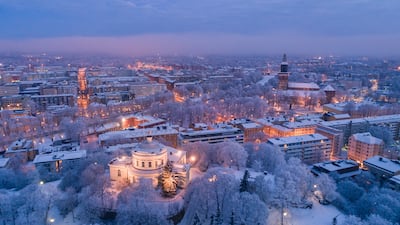Amid the rows and recriminations of the UN’s Cop26 climate change summit in Scotland, negotiators might do well to look to Finland.
In the coastal city of Turku, officials have already brought down emissions, from 1990 levels, by more than half and are set to go carbon neutral before the end of the decade.
The environmental policies of the administration include eco-friendly transport and producing heating from burning wood chips, a by-product of its forestry industry.
The schemes have stretched to replacing beef on school menus with vegetable protein and introducing a lending system for sewing machines and snow shovels to reduce consumption.
“At the end of the day, it’s not what you promise but what you do,” said the city’s mayor Minna Arve at the Cop26 summit in Glasgow. “Turku is one of the most ambitious cities in the world in terms of climate actions.”
The success of Turku has meant that Ms Arve was asked to brief UN Secretary General Antonio Guterres on what the city had achieved.
Nations at the talks have been urged to “strain every sinew” to secure a deal that would limit global warming to 1.5°C above pre-industrial levels. But civic mayors said they were already delivering on ambitious targets by sharing tactics with cities around the world.
Turku was helped by a history of sustainable development, a political class committed to change and an element of luck. The city's power plants needed renewal at a time when environmentally-friendly options were available and its leaders were willing to take a leap of faith in the new technologies.
Climate director Risto Veivo said the renewable options a decade ago were more costly - but the power bills are now cheaper in Turku than in comparable cities.
"In economic terms, we haven't lost anything," he told The National. "But this was not clear from the outset."
Launched in 2005 with 18 major cities, more than 1,000 towns that are home to more than 700 million people have pledged to be net-zero emitters by 2050. Organisers said they were hoping for more cities to commit to the goal during the final days of talks.
They include Istanbul, whose mayor Ekrem Imamoglu, told the conference that global warming had altered the city’s climate. Flooding linked to climate change in Turkey’s Black Sea region this year left 82 dead. “Our target is to take every step in order to make Istanbul a carbon-neutral city that’s resilient to climate crises by 2050,” the mayor said.
The world’s urban buildings are responsible for 40 per cent of global carbon emissions. Rising temperatures could lead to 1.6 billion people living in cities regularly exposed to extremely high temperatures unless measures are taken, Cop26 organisers said.
The climate changes have seen city officials around the globe focusing on energy conservation and smart design to try to reach new targets. Mayors also spoke of schemes to supply rooftop solar panels at low cost for the poorest families and imposing taxes to reduce harmful emissions.
The UK said moving to net-zero emissions for the world’s cities would be vital to achieve the 1.5°C target. Temperatures already stand 1.1°C higher.
Greg Hands, UK Energy and Climate Change Minister, said: “By 2050 urban areas will be home to two thirds of the world population, with the speed and scale of urbanisation set to lock in high-carbon infrastructure and inequality if we do not act now.”


